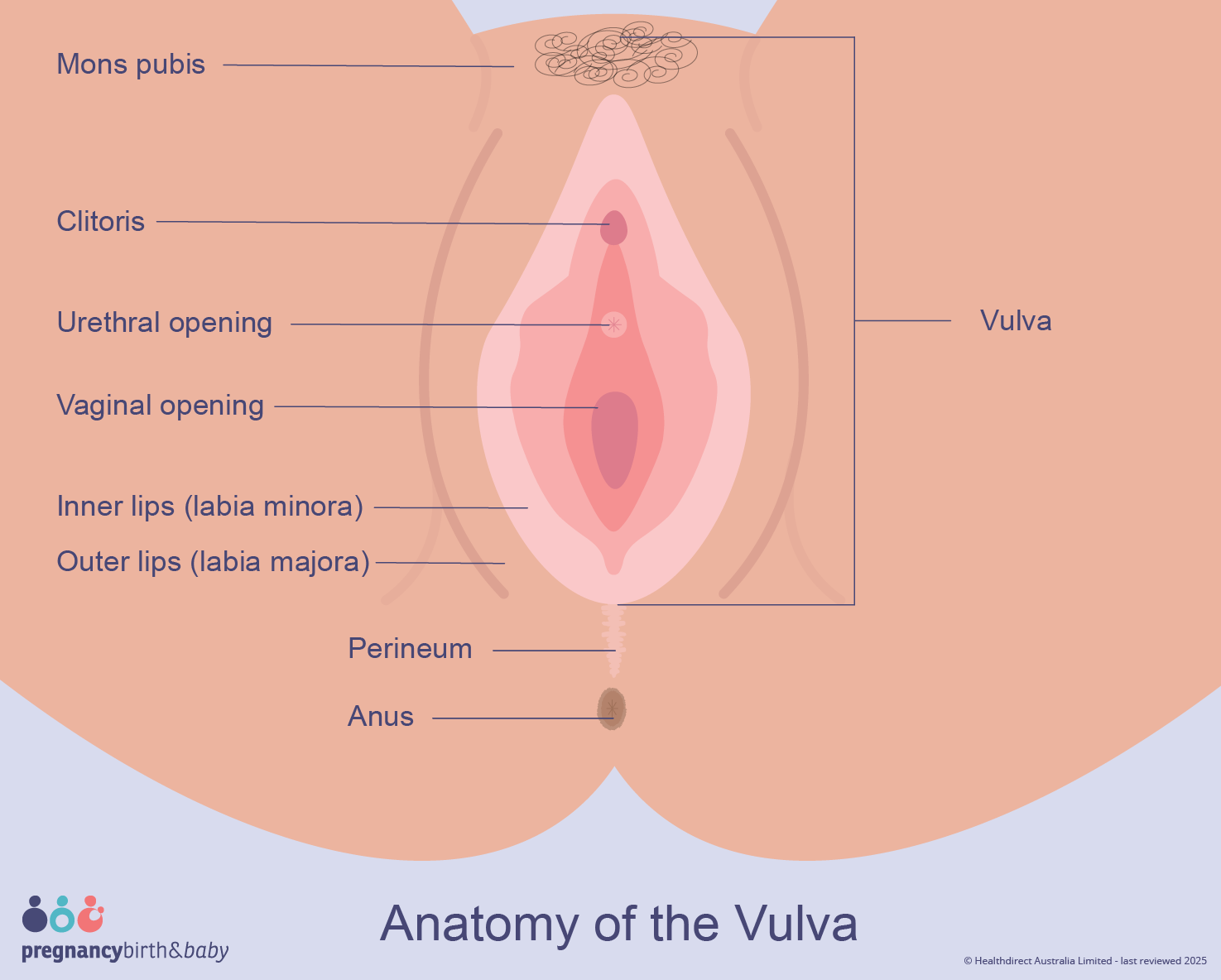Anatomy of pregnancy and birth – vulva
7-minute read
Key facts
- The vulva is the outside part of the female genitals.
- The vulva includes the labia (the lips), clitoris, opening of the vagina and urethra, and perineum.
- During pregnancy, hormonal changes can cause changes to the vulva's appearance.
- Increased blood flow to the area can make the area look more swollen and can increase your chance of developing varicose veins in the vulva.
- Vaginal birth may change the way the vulva looks.
What is the vulva?
The vulva is the outside part of the female genitals (sex organs).
The vulva includes the:
- mons pubis — a layer of fat over your pubic bone, which is covered with pubic hair
- labia majora — the outer folds of skin, also known as 'outer lips'
- labia minora — hairless, inner folds of skin, also known as 'inner lips'
- clitoris — a sensitive organ that can help with arousal
- vestibule — the opening of your vagina and urethra
- hymen — a thin piece of skin at the entrance of your vagina
- perineum — the skin between your vagina and anus
The vulva varies widely in appearance from person to person. For some people, the inner lips are longer than the outer lips. The size, colour and shape of the lips also vary. Many people worry that their genitals do not look 'normal'. Remember that there is a very wide range of 'normal'.
It is also normal to experience changes in the way your vulva looks during different stages of your life.

Visit the Labia Library for more information about labia, including a photo library.
What does my vulva do?
Different parts of the vulva have different roles. Your clitoris can help you feel aroused during sexual intercourse (sex) and masturbation. Glands in the vulva release fluid to stop the area from becoming dry.
How does my vulva change during pregnancy?
Some people may develop varicose veins around the vulva. This is caused by hormonal changes during pregnancy, and by your uterus pressing on your veins as your baby grows. Changes to the veins in your vulva often resolve with no need for treatment, but if you have ongoing pain, surgery may help.
The hormonal changes associated with pregnancy may also lead to changes in the balance of bacteria in your vagina. This can increase your chance of vaginal infections. It is important to see your doctor if you have symptoms of an infection.
You may also experience an increase in normal vaginal discharge during pregnancy.
CHECK YOUR SYMPTOMS — Use the Symptom Checker and find out if you need to seek medical help.
What happens to my vulva during childbirth?
The vulva, especially the perineum, stretches to make room for your baby's head during a vaginal birth. In some cases, this stretching during birth leads to tearing of the skin and tissues of the perineum. Small tears may heal on their own. Larger tears may need to be repaired by your midwife or doctor with stitches.
You may choose to massage your perineum (or ask your partner to do it) in the weeks leading up to birth, to reduce the chance of tearing.
Learn more about perineal massage.
FIND A HEALTH SERVICE — The Service Finder can help you find doctors, pharmacies, hospitals and other health services.
How does my vulva change after birth?
After a vaginal birth, your vulva may look different. It may be stretched, bluish and swollen. In particular, the labia minora may look more stretched out. This is normal and nothing to worry about, but see your midwife or doctor if you are concerned.
It is also common for sexual intercourse to be painful or uncomfortable after birth, so see your doctor or midwife if pain during sex is a problem for you.
Read more on painful sex.
You should see your doctor if you have:
- vulval pain, itch or discomfort
- a change in the colour or odour of your vaginal discharge
- pain while urinating
- pain during sex
ASK YOUR DOCTOR — Preparing for an appointment? Use the Question Builder for general tips on what to ask your GP or specialist.
Resources and support
- The Royal Australian and New Zealand College of Obstetricians and Gynaecologists has a helpful resource answering some common questions people have in pregnancy.
- Learn about practising perineal massage during your pregnancy with The Royal Women's Hospital handout.
- Read about self-care for expecting and new parents at PANDA.
- Call Pregnancy, Birth and Baby to speak to a maternal child health nurse on 1800 882 436 or video call. Available from 7 am to midnight (AET), 7 days a week (including public holidays).
Languages other than English
- The Multicultural Centre for Women's Health has a catalogue of health resources available in many community languages.
Information for Aboriginal and/or Torres Strait Islander peoples
- You can find out more about Aboriginal and/or Torres Strait Islander pregnancy health on Stronger Bubba Born, or watch the How to Have a Safer Pregnancy video.
Information for sexually and gender-diverse families
- PANDA provides inclusive and appropriate support for LGBTIQA+ expecting and new parents.

Speak to a maternal child health nurse
Call Pregnancy, Birth and Baby to speak to a maternal child health nurse on 1800 882 436 or video call. Available 7am to midnight (AET), 7 days a week.
Learn more here about the development and quality assurance of healthdirect content.
Last reviewed: November 2024





